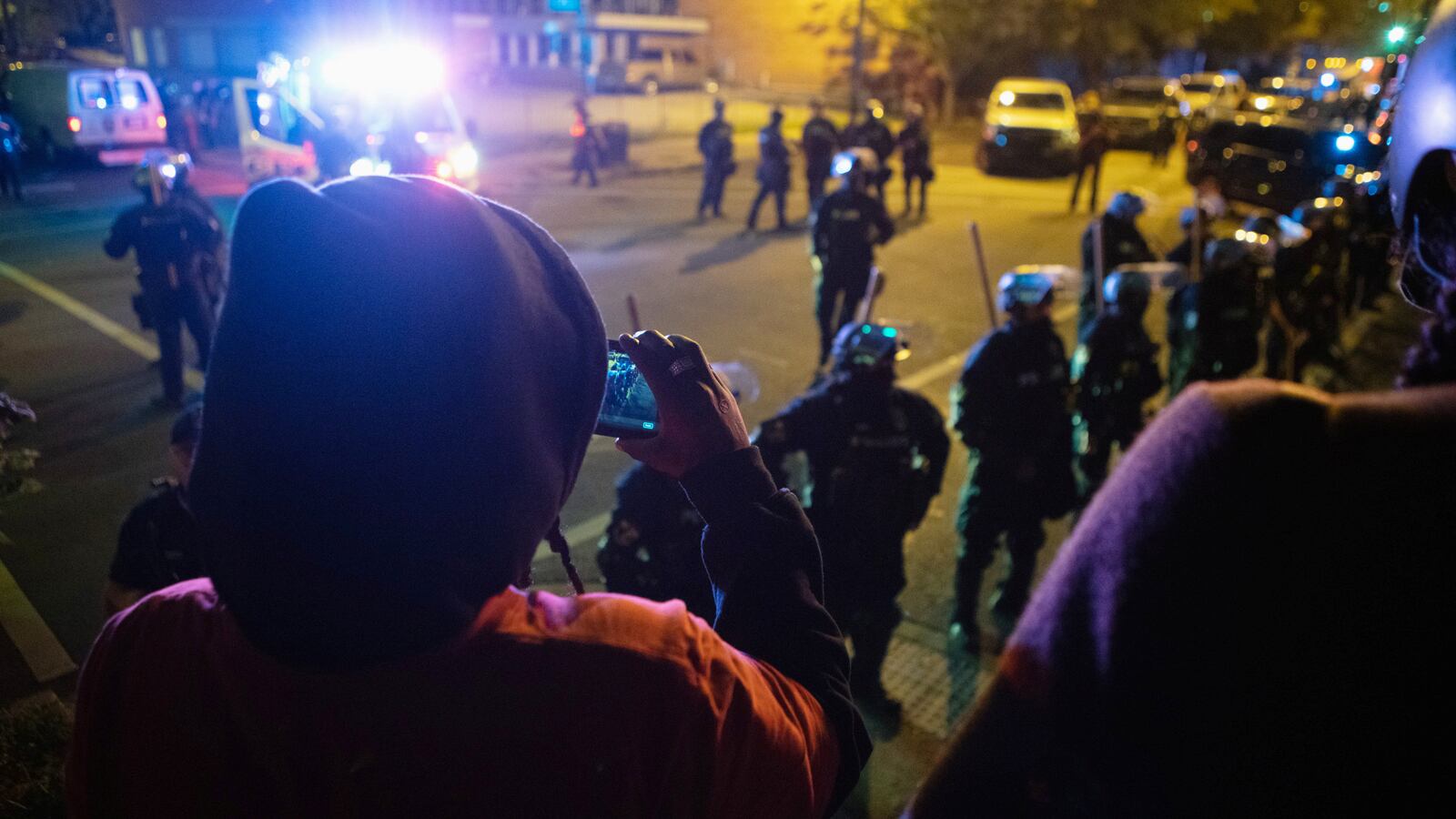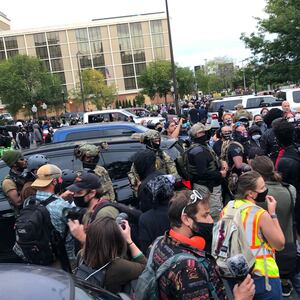When Kentucky Rep. Attica Scott, the only Black woman in the state’s legislature, was arrested at a protest last month, she assumed she’d been booked on a curfew violation.
She wasn’t.
Instead, Scott and 17 other racial-justice protesters arrested alongside her were booked on a much more serious charge: rioting. The allegation was they had marched near—that is, proximal to—someone who vandalized a library.
Even local prosecutors couldn’t stomach the case: On Tuesday, the county attorney who brought those charges announced he was dropping them, calling them too hard to prosecute.
Now a fellow state lawmaker is taking aim at the murky riot law that led to the mass arrests in the first place, an effort to help stem the tide of harsh crackdowns on protesters across America.
Scott was arrested hours after a prosecutor declined to press charges against any cop for the killing of Breonna Taylor, a Black woman who was shot to death by Louisville police officers during a botched attempt to serve a warrant on her home in March. Police obtained a warrant for a “no-knock” raid (later changed to a “knock and announce” raid) on Taylor’s home and, while details about how police actually entered remain in contention, a prosecutor announced charges against one cop for firing into Taylor’s neighbors’ walls.
The announcement, which did not include charges for shooting Taylor, sparked a national outcry, especially in Louisville, where a mass of marchers took to the streets, over 100 people were arrested, protesters were pepper sprayed and hit with flash-bangs, and two cops were shot.
Amid the chaos, someone broke a library window and threw a flare inside. Local media that witnessed the library vandalism said it was the work of one person, not a group. Nevertheless, Louisville Police—whom Scott and others were protesting—arrested them on the grounds that they were “part of a large group” allegedly involved in that act.
It didn’t matter that Scott and others—including her 19-year-old daughter Ashanti and prominent local organizer Shameka Parrish-Wright—were not accused of property damage. Kentucky’s riot law allows groups of people to be charged for the actions of others.
The law, as used in Scott’s case, is overbroad—and not even used the way it was intended, according to fellow Kentucky Rep. Lisa Willmer. She’s proposing legislation called “Attica’s Law” to prevent future mass riot charges against protesters who aren’t directly accused of wrongdoing.
“What happened in Representative Scott's case, and in so many arrests that we have seen over the past several months, has just been real misapplication of the law,” Willmer told The Daily Beast.
Currently, Kentucky’s riot statute applies to people who "knowingly participate" in a riot that results in significant injuries or property, Louisville’s Courier-Journal reported. (The state defines a riot as a violent public disturbance of five or more people that creates a dangerous situation.)
Open-ended language about “knowing participation” can make riot laws like Kentucky’s ripe for abuse. Some of those laws have origins in previous civil-rights protest movements: When some 200 protesters, journalists, and observers were arrested outside President Donald Trump’s inauguration in January 2017, they were charged under a local Civil Rights-era riot law that allowed them to be prosecuted as a group, even if individuals weren’t accused of specific wrongdoing.
The Justice Department this year pushed charges against a number of racial justice protesters using an anti-rioting provision of the Civil Rights Act of 1968 that was designed by conservatives to combat Martin Luther King Jr.-era unrest, as HuffPost noted. (In one recent case, the DOJ argued that those federal charges were relevant because a defendant allegedly made a Molotov cocktail in a Patron bottle. The bottle, because it originated in Mexico, was classed as an “unregistered firearm” that had traveled interstate.) Even more recently, governors in Florida and Texas proposed legislation that would make it easier to charge protesters with mafia-style racketeering conspiracies as a group, even if (in the case of Texas) the accused wasn’t even at the protest.
Willmer said that when the original Kentucky law was passed, lawmakers voted to include commentary by a set of state judges who indicated it should be used narrowly.
“What the commentary makes really clear is that you have to be explicitly engaging in the act, or you have to be explicitly encouraging or inciting people to break that window, set that fire,” she told The Daily Beast. “Short of that, it should not be a rioting charge.”
In Scott’s case, she and fellow defendants said they knew nothing about the damage to the library. (In fact, Scott has been a champion of Louisville’s libraries in budget negotiations; her son started a book club there.) Instead, Scott, who authored “Breonna’s Law” banning no-knock raids—or raids where officers do not have to issue a warning before entering private property—accused Louisville police of retaliating against her and other defendants.
"If there's anyone that thinks this was not political retaliation because some of us have signed on to a lawsuit with the ACLU [American Civil Liberties Union] against LMPD for tear-gassing us, or because we have filed Breonna's Law, then I have a conversation I need to have with you," Scott said in a press conference after her charges were announced.
On Tuesday, the county attorney bailed.
"We would need clear-cut evidence that these individuals before you today were working with those who committed that property damage," the attorney said in a Tuesday hearing. "The evidence we have reviewed thus far does not support that."
Still, the prosecutor was pushing misdemeanor charges of unlawful assembly and failure to disperse—Scott told CNN she would fight those charges, too.
But under Willmer’s “Attica’s Law,” the state would overhaul its language about rioting to adhere to its strict definition under what she said was the original intent of lawmakers.
The often-overlooked commentary is “the geeky part” of the law—but it’s still the law, Willmer said. And while advancing legislation like that doesn’t repair the lingering sense of injustice in the Breonna Taylor case, it could make it harder for cops to snuff out rage over such killings in the future.
Willmer said she hoped for bipartisan support from Republican lawmakers, although some early commentators had accused her of trying to change the law to help her Democratic colleague.
“Nothing could be further from the truth,” she said. “This is to clarify [the law] for all the people who have been wrongfully charged over the past several months with rioting.”








